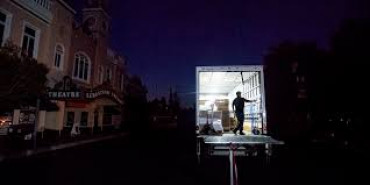blackouts
'Stock up on blankets': Ukrainians brace for horrific winter
Ukraine could face rolling blackouts across the country through March, an energy expert said, due to what another official described Tuesday as the “colossal” damage done to Ukraine's power grid by relentless Russian airstrikes. Ukrainians are being told to stock up on supplies, evacuate hard-hit areas — or even think about leaving the country altogether.
Sergey Kovalenko, the CEO of private energy provider DTEK Yasno, said the company was under instructions from Ukraine’s state grid operator to resume emergency blackouts in the areas it covers, including the capital Kyiv and the eastern Dnipropetrovsk region.
“Although there are fewer blackouts now, I want everyone to understand: Most likely, Ukrainians will have to live with blackouts until at least the end of March,” Kovalenko warned in a Facebook post.
“I think we need to be prepared for different options, even the worst ones. Stock up on warm clothes, blankets, think about what will help you wait out a long shutdown,” he said, addressing Ukrainian residents.
Russia has been pummeling Ukraine’s power grid and other infrastructure from the air for weeks, as the war approaches its nine-month milestone. That onslaught has caused widespread blackouts and deprived millions of Ukrainians of electricity, heat and water.
“This winter will be life-threatening for millions of people in Ukraine,” said Dr. Hans Henri P. Kluge, the World Health Organization's regional director for Europe, due to the lack of power and Ukraine's damaged health facilities.
Read more: Ukraine to civilians: Leave liberated areas before winter
Temperatures commonly stay below freezing in Ukraine in the winter, and snow has already fallen in many areas, including Kyiv. Ukrainian authorities have started evacuating civilians from recently liberated sections of the southern Kherson and Mykolaiv regions out of fear that the winter will be too hard to survive.
Kovalenko said even if no more Russian airstrikes occur, scheduled outages will be needed across Ukraine to ensure that power is evenly distributed across the country's battered energy grid.
Ukrainian President Volodymyr Zelenskyy says Russian missile strikes have damaged more than 50% of the country’s energy facilities.
“The scale of destruction is colossal” on the power grid from the Russian barrage last week, Volodymyr Kudrytskyi, the CEO of Ukrenergo, the state-owned power grid operator, told Ukrainian TV on Tuesday.
He said Ukraine has “practically no intact thermal (or) hydroelectric power plants” following the large-scale attack by Moscow on Nov. 15.
Also Tuesday, the Kyiv regional authorities said more than 150 settlements were enduring emergency blackouts due to the onset of winter weather, including snowfall and high winds. More than 70 repair teams have been deployed to restore power across the province.
The battle for terrain has continued unabated despite the deteriorating weather conditions, with Ukrainian forces pressing against Russian positions as part of a weeks-long counteroffensive and Moscow’s forces keeping up shelling and missile strikes.
In a key battlefield development, a Ukrainian official acknowledged that Kyiv’s forces are attacking Russian positions on the Kinburn Spit, which is a gateway to the Black Sea basin and parts of the southern Kherson region that are still under Russian control.
Natalia Humeniuk, a spokesperson for the Ukrainian army’s Operational Command South, said in televised remarks that Ukrainian forces are “continuing a military operation” in the area.
Read more: Shells hit near nuclear plant; blackouts roll across Ukraine
The Kinburn Spit is Russia’s last outpost in Ukraine’s southern Mykolayiv region, directly west of Kherson. Ukrainian forces recently liberated other parts of the Kherson and Mykolaiv regions. Moscow has used the Kinburn Spit as a staging ground for missile and artillery strikes on Ukrainian positions in the Mykolaiv province, and elsewhere along the Ukrainian-controlled Black Sea coast.
Ukraine recently recaptured the city of Kherson, on the western bank of the Dnieper River, and surrounding areas.
Recapturing the Kinburn Spit could help Ukrainian forces push into territory that Russia still holds in the Kherson region “under significantly less Russian artillery fire” than directly crossing the Dnieper, a Washington-based think tank said. The Institute for the Study of War added that control of the area would help Kyiv alleviate Russian strikes on Ukraine’s southern seaports and allow Ukraine to increase its naval activity in the Black Sea.
Meanwhile, Ukraine’s presidential office said Tuesday that at least eight civilians were killed and 16 were injured over the previous 24 hours, as Moscow’s forces once again used drones, rockets and heavy artillery to pound eight Ukrainian regions.
In the eastern Donetsk region, fierce battles continued around the city of Bakhmut, where the Kremlin’s forces are keen to clinch a victory after weeks of embarrassing military setbacks. Donetsk Governor Pavlo Kyrylenko also said Russia launched missiles at the city of Kramatorsk, a Ukrainian military hub, and on the strategic city of Avdiivka.
He added that power and communications were nonexistent in most of the Donetsk region.
According to Ukraine’s presidential office, one civilian was killed and three others wounded after Russia shelled the city of Kherson, which Ukrainian forces recaptured on Nov. 10.
Since Russia invaded on Feb. 24, the war has killed at least 16,784 civilians and injured 10,189, the U.N. High Commissioner for Human Rights estimates.
But U.S. Army General Mark Milley, chairman of the Joint Chiefs of Staff, estimated earlier this month that some 40,000 Ukrainian civilians have been killed or wounded.
3 years ago
Shells hit near nuclear plant; blackouts roll across Ukraine
Powerful explosions from shelling shook Ukraine's Zaporizhzhia region, the site of Europe's largest nuclear power plant, the global nuclear watchdog said Sunday, calling for “urgent measures to help prevent a nuclear accident” in the Russian-occupied facility.
A heavy barrage of Russian military strikes — almost 400 on Sunday alone — also hit Ukraine's eastern regions, and fierce ground battles shook the eastern Donetsk province, Ukraine's president said in his evening update.
Rafael Mariano Grossi, the director general of the International Atomic Energy Agency, said multiple explosions near the plant — on Saturday evening and again on Sunday morning — abruptly ended a period of relative calm around the nuclear facility that has been the site of fighting between Russian and Ukrainian forces since Russia invaded on Feb. 24.
The fighting has raised the specter of a nuclear catastrophe ever since Russian troops occupied the plant during the early days of the war.
In renewed shelling both close to and at the site, IAEA experts at the Zaporizhzhia facility reported hearing more than a dozen blasts within a short period Sunday morning and could see some explosions from their windows, the agency said.
Read more: UK PM Sunak makes surprise trip to Kyiv, boosts defence aid
Later in the day, the IAEA said the shelling had stopped and that its experts would assess the situation on Monday.
“There has been damage to parts of the site, but no radiation release or loss of power,” the agency said.
Still, Grossi called the shelling “extremely disturbing,” and appealed to both sides to urgently implement a nuclear safety and security zone around the facility.
“Whoever is behind this, it must stop immediately," he said. “As I have said many times before, you’re playing with fire!”
Russia has been pounding Ukraine’s power grid and other infrastructure from the air, causing widespread blackouts and leaving millions of Ukrainians without heat, power or water as frigid cold and snow blankets the capital, Kyiv, and other cities.
Ukraine’s state nuclear power operator, Energoatom, said Russian forces were behind the shelling of the Zaporizhzhia plant, and that the equipment targeted was consistent with the Kremlin’s intent “to damage or destroy as much of Ukraine’s energy infrastructure as possible" as winter sets in.
The weekend strikes damaged the system that would enable the plant's power units 5 and 6 to start producing electricity again for Ukraine, the power operator said. The State Nuclear Regulatory Inspectorate of Ukraine hopes to bring the two units to a minimally controlled power level to obtain steam, which is critical in winter for ensuring the safety of the plant and the surrounding area, Energoatom said.
Moscow, meanwhile, blamed Ukrainian forces for the damage. Russian Defense Ministry spokesman Igor Konashenkov accused the Ukrainians of shelling the power plant twice on Sunday and said two shells hit near power lines supplying the plant with electricity.
Elsewhere in the Zaporizhzhia region, Russian forces shelled civilian infrastructure in about a dozen communities, destroying 30 homes, Ukrainian President Volodymyr Zelenskyy’s office said Sunday. Twenty buildings were damaged in shelling at Nikopol, a city across the river from the Zaporizhzhia plant, it said.
Read more: Deadly missile strike adds to Ukraine war fears in Poland
In his evening address, Zelenskyy said Ukrainian forces were making small gains in the eastern Luhansk region and were holding their ground in battles in the south.
Blackouts were scheduled Sunday night in 15 regions of Ukraine and the city of Kyiv, Zelenskyy said. The country’s power utility, meanwhile, said there would be scheduled outages in every region on Monday.
“The restoration of networks and technical supply capabilities, the de-mining of power transmission lines, repairs — everything goes on round the clock,” Zelenskyy said.
Three districts in the northern Kharkiv region — Kupyansk, Chuguiv and Izyum — also came under Russian artillery fire.
The situation in the southern Kherson region “remains difficult,” the president's office said, citing Ukraine's armed forces. Russian forces fired tank shells, rockets and other artillery on the city of Kherson and several nearby settlements that were recently liberated by Ukrainian forces.
Shelling late Saturday struck an oil depot in Kherson, igniting a huge fire that sent billowing smoke into the air. Russian troops also shelled people lining up to get bread in Bilozerka, a town in the Kherson province, wounding five, the report said.
In the city of Kherson — which still has little power, heat or water — more than 80 tons of humanitarian aid have been sent, said local official Yaroslav Yanushevych, including a UNICEF shipment of 1,500 winter outfits for children, two 35-40-kilowatt generators and drinking water.
Also on Sunday, a funeral was held in eastern Poland for the second of two men killed in a missile explosion Tuesday. The other man was buried Saturday. Poland and the head of NATO have both said the missile strike appeared to be unintentional, and was probably launched by Ukraine as it tried to shoot down Russia missiles.
3 years ago
With warming, get used to blackouts to prevent wildfires
Washington, OCT 12 (AP/UNB) — Expect more preventative power blackouts in California as the climate gets hotter and drier and the wildfire season gets nastier and longer, scientists say.
6 years ago
California utility faces gripes over deliberate blackouts
Los Angeles, Oct 11 (AP/UNB) — Even as the winds gusted dangerously as forecast, California's biggest utility faced hostility and second-guessing Thursday for shutting off electricity to millions of people to prevent its equipment from sparking wildfires.
6 years ago







